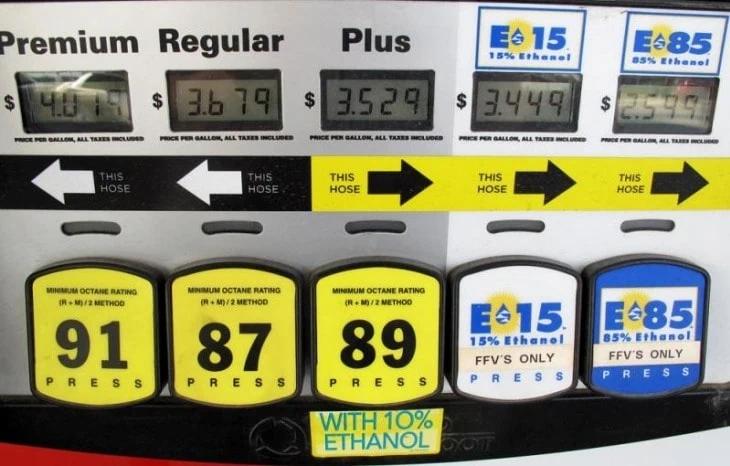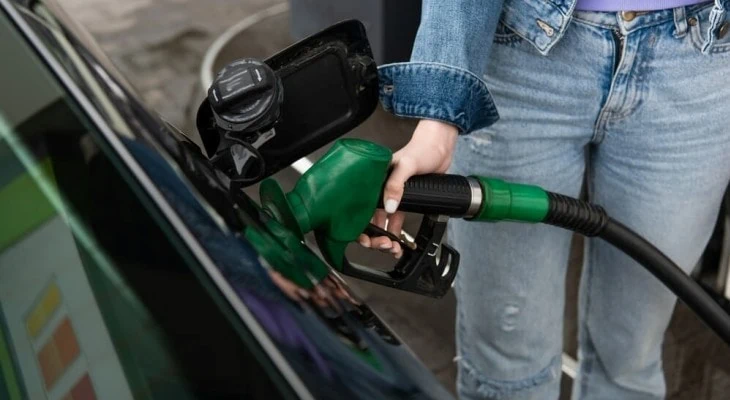Today multiple types of gasoline are being used to keep our cars running, which can be confusing. On top of that, endless distractions make selecting the wrong kind of gas easier than ever.
You may be wondering if you should be worried about accidentally putting non-ethanol gasoline in your car.
Accidentally putting non-ethanol gasoline in your car will not harm the engine; however, it is best to follow the manufacturer’s recommendations for your specific vehicle so it can perform its best.
Don’t get panicked at the pump! Continue reading to learn everything you need to know about the different kinds of gas and how they affect your vehicle.
Table of Contents
What Happens If You Put Non-Ethanol Gas in Your Car?

If you got distracted at the pump and accidentally put ethanol-free gasoline in your car, it’s okay. Take a deep breath and relax. It won’t hurt your vehicle if this happens occasionally.
You’ll be pleased to know that internal combustion engines were originally made to run on pure gasoline (a.k.a. petrol). On the other hand, ethanol is a bio-fuel that can be produced from organic sources (that are renewable).
Mixing regular gasoline with small amounts (usually between 5% to 15%) of ethanol (known as ‘ethanol blending’) began as an easy way to cut the consumption of regular gasoline by a small amount.
Ethanol-free gasoline was most popular during the mid to late 1990s but became difficult to find due to government regulations and supply shortages due to the high demand for crude oil.
The use of ethanol originally became popular in the US in the early 1900s, during the World Wars and The Great Depression when fuel supplies were extremely low. It made sense to blend some ethanol with regular gas to cut gas consumption in such moments of crisis. Later, it became the norm!
Can You Mix Ethanol and Non-Ethanol Gas in a Car?
So, now that you know it’s okay to use ethanol-free gasoline in your vehicle but you may be wondering if you can safely mix ethanol gasoline with ethanol-free gasoline.
Mixing ethanol gasoline with non-ethanol gasoline is not harmful to your vehicle and does not pose any safety concerns.
Nowadays most of the gasoline that you get from the pump is already ethanol-blended (a mixture of ethanol and pure gasoline) which is why it won’t hurt if you accidentally mix the two, since modern engines are designed to run on ethanol-blended fuel.
Is Ethanol-Free Gas Better for Cars?

Simply put, gasoline that contains ethanol is better for the environment in some ways and the government’s pocketbook (by reducing crude oil imports) but not necessarily better for a vehicle’s engine and fuel system.
Fuel that is ethanol-free is considered to be better for improving gas mileage, increasing horsepower, and reducing the chance of getting water in the tank.
Ethanol tends to attract water, which can eventually cause rust build-up in the tank and other parts of the fuel system.
This is more concerning for people who live in very moist climates and/or in vehicles that are not regularly driven. Letting a vehicle sit for long periods is more damaging than driving it every day, especially these days when ethanol-blended gas is the norm.
Below is a recap of some pros and cons of using ethanol gas in your vehicle.
| Advantages of Ethanol Gasoline | Disadvantages of Ethanol Gasoline |
| ● Helps the environment by producing fewer emissions and can be made from waste products ● Has a higher octane level which means a cleaner exhaust system | ● Tendency to draw water to the tank and fuel system causing corrosion ● Decreases fuel efficiency and horsepower |
Understanding the differences between types of gas and heeding the manufacturer’s advice will help you to make the right decision when it comes time to make a trip to the pump.
Octane Levels – What Do They Mean

Octane has to do with the level of stability that a particular gasoline has rather than how much ethanol is or isn’t present in the mixture.
Generally, there are three choices at the pump for different octane levels.
- Regular – 87
- Mid-Grade – 89
- Premium/Premium Plus – 91/94
Most vehicles today run on regular gasoline, but there are cases where higher octane gasoline may be needed. For example, in the case of premium/luxury/performance cars.
This is where paying attention to your owner’s manual comes in handy. Knowing which octane level is recommended for your vehicle will help it to run better.
The purpose of using gasoline with a higher octane level is to reduce the instances of pre-ignition knocking that can occur when starting the vehicle.
Gasoline with a higher octane level is generally put in motors with a higher compression ratio to prevent them from making a knocking sound when starting the vehicle.
Newer vehicles come standard with a sensor that helps to prevent a knocking sound when starting a vehicle, which is why older vehicles tend to use a higher octane mixture.
In Conclusion – Non-Ethanol Gas is Harmless to Car Engines
As you have learned from the information I mentioned above, accidentally using ethanol-free gasoline or mixing the two will not hurt your vehicle’s engine or fuel system.
To keep your car running the best, always follow the recommendations listed in your owner’s manual and have a professional perform regular preventative maintenance.


Thank goodness the regular pump didn’t work -so, I backed up and hurriedly put in 90. When I saw the price … I realized what I had done.
Instant freak out!!